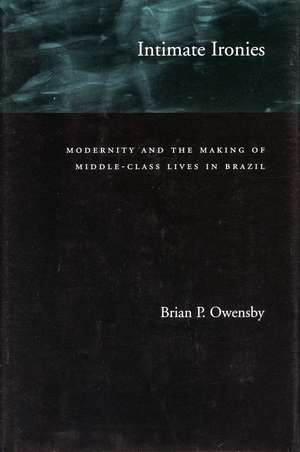Intimate Ironies: Modernity and the Making of Middle-Class Lives in Brazil
Autor Brian Owensbyen Limba Engleză Hardback – 31 ian 1999
The middle-class condition, seen during the twentieth century as both the symbol of progress and order and the means to achieve it, has largely evaded historical analysis. Blending historical methods and anthropological sensibilities, Intimate Ironies relates the everyday lives of an emergent white-collar middle class to Brazilian national politics in the twentieth century. Focusing on the period between 1920 and 1950, the author looks beyond ideologies to reveal how, amidst the turmoil of modernization, middle-class men and women strained to wrest order from the ordeal of change.
Drawing on legacies of hierarchy and patronage and orienting themselves in very concrete ways to the middle-class ideal of Western modernity, these Brazilian men and women recast the meaning of work and home to set themselves apart from those below them and to project a sense of moral superiority over those above. The author shows how anxieties growing out of this ambivalent position deeply conditioned their role in national politics, from experiments groping toward middle-class populism during the 1930's to the moralistic distrust of institutional politics that characterized the middle-class political outlook after World War II.
Intimate Ironies represents a novel approach to the history of urban middle classes in the twentieth century. Most studies of the middle class have concentrated on culture or political behavior; rarely have the two been brought together. By linking everyday life and politics, the book reinvigorates the study of political history and class in modern Latin American societies, in the process complementing recent studies of organized labor and the industrial elites in Latin America. And by telling an unorthodox story of the middle class, the author challenges the very possibility of a linear, progressive narrative of social development.
Drawing on legacies of hierarchy and patronage and orienting themselves in very concrete ways to the middle-class ideal of Western modernity, these Brazilian men and women recast the meaning of work and home to set themselves apart from those below them and to project a sense of moral superiority over those above. The author shows how anxieties growing out of this ambivalent position deeply conditioned their role in national politics, from experiments groping toward middle-class populism during the 1930's to the moralistic distrust of institutional politics that characterized the middle-class political outlook after World War II.
Intimate Ironies represents a novel approach to the history of urban middle classes in the twentieth century. Most studies of the middle class have concentrated on culture or political behavior; rarely have the two been brought together. By linking everyday life and politics, the book reinvigorates the study of political history and class in modern Latin American societies, in the process complementing recent studies of organized labor and the industrial elites in Latin America. And by telling an unorthodox story of the middle class, the author challenges the very possibility of a linear, progressive narrative of social development.
Preț: 779.10 lei
Preț vechi: 1011.82 lei
-23% Nou
Puncte Express: 1169
Preț estimativ în valută:
149.09€ • 154.78$ • 124.32£
149.09€ • 154.78$ • 124.32£
Carte tipărită la comandă
Livrare economică 22 martie-05 aprilie
Preluare comenzi: 021 569.72.76
Specificații
ISBN-13: 9780804733601
ISBN-10: 0804733600
Pagini: 348
Dimensiuni: 127 x 203 x 28 mm
Greutate: 0.59 kg
Ediția:1
Editura: Stanford University Press
Colecția Stanford University Press
ISBN-10: 0804733600
Pagini: 348
Dimensiuni: 127 x 203 x 28 mm
Greutate: 0.59 kg
Ediția:1
Editura: Stanford University Press
Colecția Stanford University Press
Recenzii
"Scholars of Latin America usually give its middle class short shrift. Here, Owensby breaks new ground by investigating its rise in Brazil. . . . An indispensable book."—Foreign Affairs
"Owensby uses a fascinating array of sources to present his well-told tale. . . . A very good book and one that not only touches a great deal, but is also a joy to read."—American Journal of Sociology
"Owensky moves easily amid a wide array of sources—ranging from popular literature written by, and for, the middle class to foreign and sociological studies of white-collar workers in Rio de Janeiro and Sao Paulo—to execute an anthropological reading of their frustrations and aspirations. . . . His framework for understanding the middle ranks of the Brazilian social hierarchy are applicable today."—Journal of Interdisciplinary History
Notă biografică
Brian P. Owensby is Assistant Professor of History at the University of Virginia.
Textul de pe ultima copertă
“Scholars of Latin America usually give its middle class short shrift. Here, Owensby breaks new ground by investigating its rise in Brazil. . . . An indispensable book.”—Foreign Affairs
“Owensby uses a fascinating array of sources to present his well-told tale. . . . A very good book and one that not only touches a great deal, but is also a joy to read.”—American Journal of Sociology
“Owensby uses a fascinating array of sources to present his well-told tale. . . . A very good book and one that not only touches a great deal, but is also a joy to read.”—American Journal of Sociology
Descriere
Focusing on the period between 1920 and 1950, the author looks beyond ideologies to reveal how middle-class men and women strained to wrest order from the ordeal of change.
